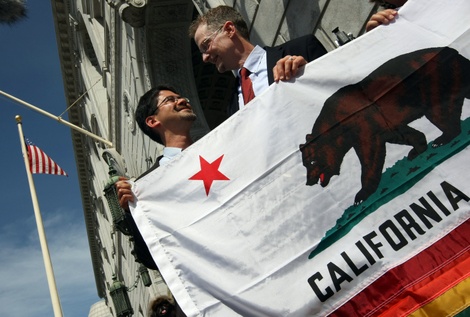Two early passages in the California decision stand out. First: this is a technical question about whether the separate-but-equal domestic partnership law violates California's constitution, not about enacting civil marriage itself:
It also is important to understand at the outset that our task in this proceeding is not to decide whether we believe, as a matter of policy, that the officially recognized relationship of a same-sex couple should be designated a marriage rather than a domestic partnership (or some other term), but instead only to determine whether the difference in the official names of the relationships violates the California Constitution...
Those are the court's italics, not mine. But on the deeper question, the court is unequivocal in arguing that our modern understanding of sexual orientation - that it is an orientation, not a choice, an identity and not an act - makes the equal protection of gay families a core value:
In contrast to earlier times, our state now recognizes that an individual’s capacity to establish a loving and long-term committed relationship with another person and responsibly to care for and raise children does not depend upon the individual’s sexual orientation, and, more generally, that an individual’s sexual orientation like a person’s race or gender does not constitute a legitimate basis upon which to deny or withhold legal rights. We therefore conclude that in view of the substance and significance of the fundamental constitutional right to form a family relationship, the California Constitution properly must be interpreted to guarantee this basic civil right to all Californians, whether gay or heterosexual, and to same-sex couples as well as to opposite-sex couples.
The Court also argues that the strict scrutiny standard should apply. Why?
Although we do not agree with the claim advanced by the parties challenging the validity of the current statutory scheme that the applicable statutes properly should be viewed as an instance of discrimination on the basis of the suspect characteristic of sex or gender and should be subjected to strict scrutiny on that ground, we conclude that strict scrutiny nonetheless is applicable here because (1) the statutes in question properly must be understood as classifying or discriminating on the basis of sexual orientation, a characteristic that we conclude represents like gender, race, and religion a constitutionally suspect basis upon which to impose differential treatment, and (2) the differential treatment at issue impinges upon a same-sex couple’s fundamental interest in having their family relationship accorded the same respect and dignity enjoyed by an opposite-sex couple.
(Photo: Stuart Gaffney (L) and his partner John Lewis hold a California flag in front of the California Supreme Court May 15, 2008 in San Francisco, California. The California Supreme Court voted 4-3 to overturn a ban on gay marriage in California making it the second state where gays and lesbians can marry. By Justin Sullivan/Getty Images.)
